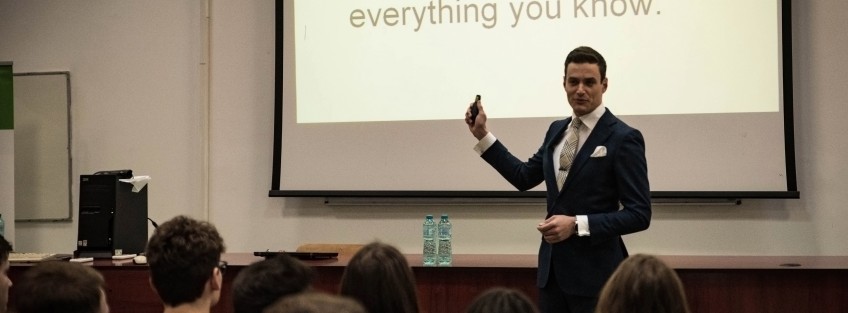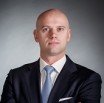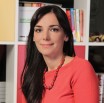Interview with Tom Leene
Thu | 22.03.2018
Other
1. Dear Tom, welcome to the NRCC Board! Firstly, please introduce yourself briefly.
Thank you very much! It is an honor and an absolute pleasure to be part of this organization! I am Tom Leene, 31 years old and moved to Romania in July of last year. I come from Zwolle, a city in the eastern part of the Netherlands were my Parents still live. I did a Bachelor in Industrial Management and after that an MSc in Business Administration at the University of Groningen. Throughout my studies, I worked in the weekends at a McDonald’s restaurant in my hometown where I became the Assistant Restaurant Manager. I always loved working there in a young and dynamic team with a great spirit.
After the university, I started at Fokker in a Manager Development Program aimed at developing the future managers of the company. Through multiple roles in Manufacturing and Program Management at several locations, I became the director of Fokker Engineering Romania in 2017.
In my spare time I like to be active and outdoors. I love to go snowboarding in the winter and running or mountain biking the rest of the year. Next to that, I love to go out with friends and discover new restaurants and cool places. Bucharest is a fantastic city in a great geographical location for all of this.
2. How did you find out about NRCC and what determined you to apply for a seat as a Board Member?
Well to be very honest I already wanted to apply for the board from the moment it became clear that my next assignment would be in Romania. My predecessor, Bas van Hese, used to be the Chairman and I was very interested in his stories on the NRCC. I believe that organizations as the NRCC can help companies and the community as a whole to grow. Further, I believe that my passion and drive to work with different cultures can complement the Board. I look forward to my new role and to an inspiring collaboration with the new team.
3. You have lived and worked in various countries from United States to Indonesia and Mexico. How did Romania welcomed you and what do you think about your first months here, professionally and personally?
I remember I had a phone call with the Head of Engineering in the Netherlands back in February 2017. He knew my project in the United States was almost completed and that I was looking at new opportunities within the company and proposed the director role in Bucharest to me. Back then, I had never visited the country and was not sure what to expect. After several long, enthusiastic talks with Bas and a visit in June I was quickly attracted to Romania and the people. I feel that Romanians are hard workers and very open and hospitable to newcomers. Our GKN Fokker office is a good example of this with great colleagues whom from the first moment were pleasant and kind to work with. Despite the big change of starting in a new, unknown country, I immediately felt comfortable and at home and I am very thankful for that.
Next to this, I love the warm, almost Latin culture of the people. I came here by myself, but quickly found so many kind and warm people around me who I now consider friends. This to me is such an important and great benefit of living in Romania.
4. With more than 12 years on the Romanian market, what would be Fokker’s next development priorities in the region?
Our company is in a very interesting phase. In 2015 GKN Aerospace, a major Aerospace supplier, procured Fokker and together we became one of the biggest tier 1 manufacturers in the world. The merger of the two companies is almost complete and resources are shared more and more between locations. Our office in Bucharest already was an Engineering Hub for Fokker, but within GKN we have the potential to further exploit this position and significantly increase in capacity and capabilities. Our proposition is excellent with high skilled engineers and we have a proven track record of success. Whether we design a tail for a new business jet or supporting the production lines in the Netherlands, our Engineers are recognized for their expertise and experience. I have full confidence that we will acquire this same position throughout the whole company.
5. Speaking about development, how would you describe last year’s market on aerospace engineering in Romania?
Since Aerospace is such a global industry where customers usually are not regional or even national, it is difficult to look at one country without taken into account macro-economic trends. As a whole the Aerospace Industry is booming, the orders books of the major aircraft manufacturers have never been so full, production pace records keep getting shattered and the trend is only up. The engineering side however paints a completely different picture; the product portfolios from most of the manufacturers are full without a direct need for new types of aircraft. The last major new programs in the market have seen severe issues, significant delays and even cancellations, nearly bankrupting some of the manufacturers and so the appetite for “starting from scratch” is lacking. There are some significant upgrade projects still undertaken, but generally speaking; everyone is waiting for the next big thing. Looking at Romania the Aerospace Engineering Industry is strong and well presented. Romania has a long, successful history in Aerospace and you see that there are relatively many companies active. Major challenge for all of these companies will be to retain their employees in the upcoming years. You see signs that the Romanian (engineering) employee market is shrinking and companies have a harder time finding the right personnel. This does not only occur in the Aerospace Industry, but also for instance in the Automotive sector where engineers from Morocco, Turkey and even Brazil are currently stationed in Bucharest because there is not enough local capacity. It shows that the Romanian market is well developed and competitive with surrounding countries, but it does create issues on the job market. Especially combined with the current demographic trends and the future Aerospace programs, I foresee a further shortage of qualified personnel.
6. If you were to describe NRCC in one sentence, what would it be?
The NRCC is an organization founded and managed by its members with the sole reason of existence to contribute in creating a healthy environment for the Dutch – Romanian business community.
7. As a final note, please send a message to our members.
I am absolutely thrilled to get started as a board member of the NRCC and will try to contribute as much as I can to its future success. The organization has seen tremendous growth in the last years and I believe my predecessors have done a great job to support this in a sustainable manner. I want to continue in this line and focus on generating more value the members. One of my main points will be education. My company experiences firsthand how extremely important a good relationship between educational institutions and the business community is. We have an intensive collaboration with the university having internships, bachelor thesis’s and even giving guest lectures. I see here a role for myself in the board, actively trying to collaborate with educational institutes.
Above all I would like to thank you for having me in your board and look forward to a inspiring time together.
2025
-
November (1)
-
October (1)
-
September (1)
-
July (1)
-
June (1)
-
April (1)
-
February (2)
-
January (1)
2024
-
November (1)
-
October (1)
-
July (1)
-
May (1)
-
March (1)
-
February (1)
-
January (1)
2023
-
November (1)
-
September (2)
-
August (2)
-
June (1)
-
May (1)
-
April (2)
-
March (1)
-
February (2)
-
January (2)
2022
-
December (3)
-
November (4)
-
October (3)
-
September (4)
-
August (3)
-
July (6)
-
June (4)
-
May (4)
-
April (8)
- Marketing News by diARK - April 2022
- Finance News by Mazars Romania - April 2022
- Experience the Perfect Chauffeur Transfer with David Intercar
- Mobility News by Business Lease - April 2022
- NRCC MEMBER IN SPOTLIGHT, WOLTERS KLUWER
- Crowe Romania and DeclaratiaUnica.ro engage in the automation of the single return form and the offering of personalized consultancy
- Cryptocurrency News by Bitcoin Romania, April 2022
- Legal News by BBW LAW - April 2022
-
March (6)
-
February (4)
-
January (5)
2021
-
December (3)
-
November (4)
-
October (2)
-
September (2)
-
August (1)
-
July (5)
-
June (3)
-
May (5)
-
April (4)
-
March (7)
- Cryptocurrency News by Bitcoin Romania, April 2021
- HR News by CNA International Executive Search Romania, March
- Real Estate News by CTP Invest, March 2021
- Sale-Purchase of Agricultural Land Located Outside Build-Up Areas
- MEET THE NRCC BOARD CANDIDATES 2021
- Fleet Management – Complete Makeover or Small Adjustments?
- Cryptocurrency News by Bitcoin Romania, March 2021
-
February (5)
-
January (6)
2020
-
December (2)
-
October (2)
-
September (3)
-
August (2)
-
July (6)
- NRCC Member in Spotlight Interview - Autonom
- Insolvency Proceedings: New Rules
- Member in Spotlight, UniCredit Bank
- Financing opportunities overview for large enterprises, SMEs and other organizations
- Companies: Simplification of Formalities
- Call for Leaders | What is your readiness score to benefit from the EU SURE initiative?
-
June (5)
-
May (8)
- The State of Alert. New rules for the collective proceedings
- The Retail Industry
- EU grants up to 6 Mil Euro for SME-s investment projects
- Member in spotlight, Heisterkamp Transportation Solutions
- State of Alert...What Is New
- The forced transformation of the automotive industry – Mazars analysis
- State of Alert in Romania
- Reducing the Impact of the Pandemic
-
April (6)
-
March (2)
2019
-
November (2)
-
July (1)
-
June (1)
-
March (2)
-
January (1)
2018
-
October (2)
-
September (1)
-
August (1)
-
July (3)
-
June (2)
-
May (1)
-
April (1)
-
March (3)
-
February (13)
- NRCC Elections 2018 - Elena Badea
- NRCC Elections 2018 - Loreda Dragomir
- NRCC Elections 2018 - Simina Fodor
- NRCC Elections 2018 - Manuel Herraiz Orti
- NRCC Elections 2018 - Tom Leene
- NRCC Elections 2018 - Mircea Moga
- NRCC Elections 2018 - Ronald Oort
- NRCC Elections 2018 - Razvan Pascu
- NRCC Elections 2018 - Alexandru Popescu
- NRCC Elections 2018 - Mihaela Tudor
- NRCC Elections 2018 - Loredana Van de Waart
- NRCC Elections 2018 - Edwin Warmerdam
- NRCC Elections 2018 - Philip Aarsman
2017
-
November (1)
-
September (1)
-
August (2)
-
May (1)
-
April (2)
-
March (1)
2016
-
November (1)
-
September (8)
-
June (1)
-
February (2)








